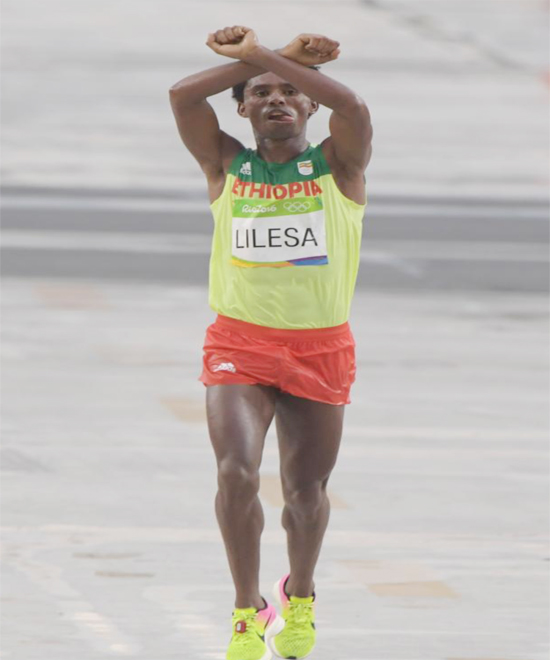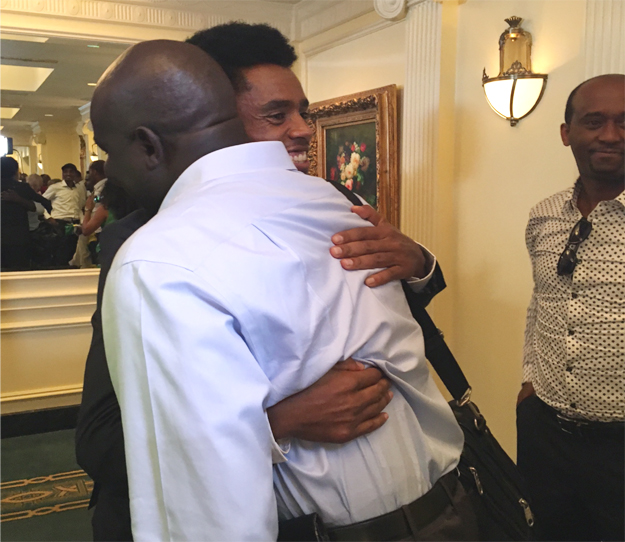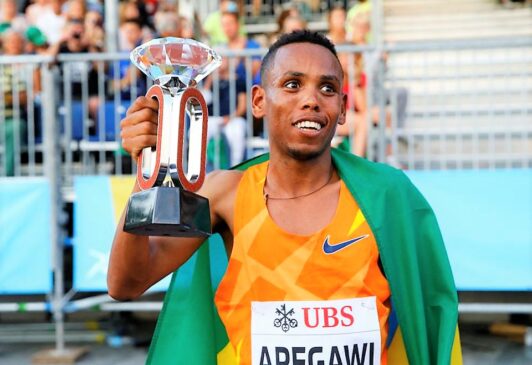Feyissa Lilesa: A man whose actions and ideals inspire us to embrace all Ethiopians as our people
OPINIONS
Human rights work might be compared to preparing for a long race— like a marathon— requiring long, hard, and grueling dedication to a task where the final outcome— often years in the future—remains unknown. At times along the way, the barriers to success appear so large that one can easily get off course and go through periods where the possibility of reaching the ultimate goals looks grim. In the midst of that struggle, something can suddenly emerge from what otherwise appears as darkness, which acts to bring new light, insight and a change of attitude to those who witness it.
For Ethiopians, that unexpected source of new inspiration is Feyissa Lilesa, the Ethiopian winner of the silver medal for the marathon Olympic event held in Brazil on August 21, 2016.
His actions have jumpstarted a swell of renewed hope and vigor among Ethiopians who see him as an Ethiopian for all Ethiopians. Feyissa, an Oromo, made a stand against oppression when he crossed his wrists and lifted his arms over his head as he ran across the finish line in Rio. His actions brought international attention to human rights conditions in Ethiopia.
His expression of protest was the same as that of many other Oromos who had been protesting since November 2015 regarding the land grabs and eviction of tens of thousands of Oromo from their homes and land. More recently the protests had intensified. As they demanded their rights, they symbolized that struggle by crossing their wrists, as if handcuffed, and holding their arms above their head as a sign of a peaceful, non-violent protest against injustice and oppression in general. The regime’s security forces had responded with bullets; killing thousand of protestors Oromia and Amhara regions, since November 2015. The victims included children, youth, pregnant women, and the elderly. Disturbing images of their dead bodies flooded the social media, further inciting protests and outrage.
In response to Feyissa’s gesture of protest, he has been recognized as a hero of the Oromo people. However, after I had the opportunity to listen to Feyissa Lilesa talk at a press conference held in Washington DC this week and to also personally meet with him, I discovered Feyissa to be clearly and decisively bigger and more complex than his ethnic identity.
His ideas break through the ideological barriers of ethnocentric thinking— views that are promoted and exploited by the current regime of the TPLF-controlled EPRDF as a tool to divide and disempower Ethiopians of differing ethnicities. Many expected him to focus only on the Oromo, while ignoring others— an approach favored by the TPLF— but, he did not.
In his responses to many questions posed by the press, he articulated viewpoints that were inclusive to all Ethiopians. He did not claim grievances as only an Oromo experience, but instead attested that the oppression being experienced in Ethiopia had no ethnic, religious or geographical limitations.
In an article appearing in The Guardian on September 13, the author quotes Feyisa’s remarks to reporters: “The Ethiopian government is killing, imprisoning and oppressing its own people. The situation in Oromia, Amhara and Gambella region is deeply concerning at the moment.
“I’m an Oromo, I grew up in Oromia, so I understand the suffering of my people very well. So far the government has opened fire on peaceful protesters who are asking for their rights and more than 1,000 people have been killed. Others have been forced into exile and been slaughtered in the deserts of Libya. Many more have become food for fish in the Mediterranean Sea.”
His words reflect my own conclusions, reached after first attempting to advocate for the rights of people of my own ethnic background, the Anuak. In December 2003, the TPLF/EPRDF and militia groups they had armed, slaughtered 424 people in less than three days and later killed many more in an ongoing effort to exploit Anuak land and resources.
It was not long before I became aware of the injustice faced by others in the country and began to recognize that systemic and widespread injustice must be addressed as a whole— without either ethnic bias towards one’s own people or ethnic-based apathy towards the human rights abuses inflicted on others within Ethiopia. Sustainable freedom and justice would only come to one’s own people when it was available for all.
This led to the establishment of the Solidarity Movement for a New Ethiopia (SMNE), with the mission of advocating for the well being of all Ethiopians based on the God-given value of every life. This foundational principle is missing among those who cannot break out of their ethnic boxes. The present model of ethnic federalism feeds this viewpoint, with its blatant disregard for others and favoritism towards their own group, especially their cronies. I realized the TPLF/EPRDF’s justification for the brutal massacre of the Anuak in 2003 came out of that worldview (ideology) that devalued the human lives of the Anuak. Feyissa understands this principle and how dangerous it is to the country for Ethiopians to fall into the TPLF/EPRDF ethnic trap.
In the same article he warns:“If this situation [widespread ethnic-based killing and ethnocentric favoritism] continues as it is, I have no doubt Ethiopia is staring into the abyss. You are going to see a great tragedy unless the international community intervenes and helps bring about change in that country. I am personally very fearful this is going to take an ethnic dimension. You are going to see a Rwanda-like scenario where ethnic groups turn on each other. It is important the international community understands the gravity of the situation and intervenes so we don’t have to go there.”
What is lacking in Ethiopia today is the inability to see the humanity of others. The fight before us is more about false ideas that people have adopted as truth. When followed, perpetual competition and disharmony with others results. Ideas matter and even good people can take on flawed ideas that can lead to mutual destruction. When those ideas are not based on God’s truth, they can lead to immoral and selfish decisions, to hate instead of love and compassion, to greed instead of fairness and generosity, to pride instead of humility, or to lies instead of honesty and integrity. When they become part of a family, community, culture, or nation, they can bring destruction.
As a member of a minority group— and there are many of us who have been marginalized, discriminated against and cut-off from the mainstream for years— it is not an easy thing to challenge the status quo.
The system we have now is based on lies and deception. It fails to uphold the humanity of others. In such a system, only the power holders benefit. Morality is gone and to avoid accountability, the manipulation of truth creates an illusion. It makes it almost impossible to correct the system since those who stand for truth are crushed. It has pushed the society to the point of ethnic explosion and disintegration— to the killing of each other and to a possible genocide. Life in Ethiopia is not based on the common good for the people, but is twisted to give in to the whims and ambitions of those with power. It has pushed people to view “the other” as the enemy; again, failing to see the God-given humanity of others.
Over the past years and months, Ethiopians have been trying to inform the world about these senseless crimes being committed across Ethiopia on almost a daily basis. The main response has come from human rights groups. This has not only been the case regarding the people of Oromia, but also that of Ethiopians from Gambella to the Somali region, from Afar to Benishangul, from the Amhara region to the people of the South and so on. It is as if the screams of the people were silent, despite efforts to raise awareness.
Yet, as Ethiopians see their family members dying at the hands of the TPLF/EPRDF, they ask; why are we being ignored? Why is our pain unnoticed as we lose our families? It is like someone having an operation without enough medication to block the pain; but yet, not enough strength to scream out so the doctor will stop. This is what Ethiopians have felt.
Since last November, day after day, many young Oromo have come out to protest, crossing their wrists and lifting their arms together, but many of them never returned home. Feyissa’s friends were among them, one of them burned in the recent prison fire. Suddenly, Feyissa’s voice broke through the silence and stunned the world.
The darkness surrounding the terror against Ethiopians was exposed in the light. The symbol he made when he crossed his wrists and raised his arms as he crossed the finish line to win a silver medal, brought many Ethiopians to tears, including me. His bravery showed the oppression of Ethiopians to the world and exposed the truth about the system of ethnic-based apartheid. His act of courage gave renewed hope.
When he crossed the finish line and publicly said he did it for all the people of Ethiopia, not only for one group, he shook the foundation of the hate-building ethnic divisive policies of the TPLF/EPRDF. He refused to blindly accept the limitations and deceitfulness of an ethnic-based identity, seductively imposed on many of us by the TPLF/EPRDF as a means for them to stay in power. He shows himself to be a man freed from the manipulation of the TPLF. It gave me hope that this young man could play a big role to bring unity to the people, many of whom are held captive to TPLF ideology and rule. He showed he was free to embrace the humanity of others— a God-given principle.
He became a hero to almost every Ethiopian, regardless of ethnicity or other differences. Meeting him in Washington DC for the first time this week, gave me an opportunity to find out what kind of person he was and I found him to be a genuine, humble, friendly and caring man of courage, integrity and principle— a person of faith.
He will be faced with the challenge of differing ideological viewpoints. The TPLF/EPRDF will want to force him back to their narrow definition of an Oromo in order to weaken his influence and the inspiration for the struggle he has offered. But yet, who defines him? Who defines any of us? When that definition leads to the dehumanization or disregard of others, we can know that it is not how God intends us to be.
The TPLF/EPRDF has given Ethiopians defined identifies to separate us. Those identities include the promotion of grievances that never get resolved, corrected or forgiven. For the last 25 years, people have been accepting the identities given to them without enough questioning. We must struggle against ideas that are not based on God-given truth. Perhaps Feyissa and others like him, can bridge the gap between the people. As people begin to seek resolution to their differences; it will open up new avenues to dialogue, reconciliation, cooperation and systemic justice, equality and freedom for all people.
Feyissa’s example has now been followed by others who took similar stands in races. Ebisa Ejigu crossed his arms when he was in the Quebec City Marathon in Canada. Tamiru Demissie, a visually impaired Paralympic silver medal winner in the 1,500 meter run in Rio, also crossed his arms as he ran over the finish line. Another Ethiopian Kassa Yemer the martial art crossed his arms after he won the Gold in South Korea, on n September 7, 2016. These are national heroes; but even more so, they are models of courage, boldness and principle who get what it means to be a human being.
At such a time as this, Ethiopia needs more of this kind of men and women. The New Ethiopia we are seeking will require people with the moral strength to break out of the mold— people who can see all human beings as worthy of dignity and respect.
May God strengthen and inspire Feyissa, Ebisa, Kassa, Tamiru and others like them, to act as bridges and models to others, encouraging them to discard someone else’s flawed definition of their identity and nationality, pushed on them in order to keep Ethiopians under control and from seeing each other as one people.
May God free us from ideas, attitudes, and actions that are wrong, hurtful or destructive; especially those that keep us chained to oppression and block us from valuing each other.
Please do not hesitate to email me if you have comments to: Obang@solidaritymovement.org
Photo credit: Obang Metho
Disclaimer: The opinion expressed in this article is the opinion of its author and does not necessarily reflect the opinion of Ethiosports. Therefore, Ethiosports carries no responsibility for the opinion expressed thereon.
Visit our Disclaimer page for more information.







Wow, this piece of writing is nice, my younger sister is analyzing these kinds of things, so I am going
to let know her. http://bing.org